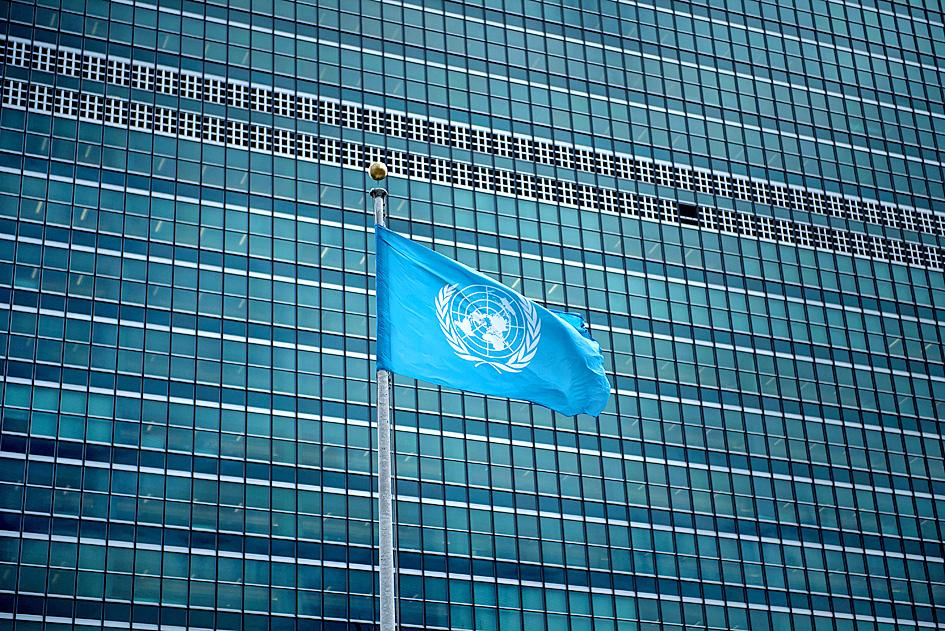Taiwan and the US on Friday held a high-level meeting on expanding Taiwan’s participation at the UN and other international organizations so that it could join efforts to tackle global challenges.
The virtual meeting, attended by officials from the Ministry of Foreign Affairs and the US Department of State, focused on helping Taiwan participate meaningfully at the UN.
The discussion also focused on bolstering Taiwan’s ability to use its expertise to address global challenges, including public health, the environment and climate change, as well as economic cooperation, according to news releases issued by both sides.

Photo: AFP
US officials reiterated Washington’s commitment to Taipei’s meaningful participation at the WHO and the UN Framework Convention on Climate Change, and discussed ways to highlight Taiwan’s ability to contribute on a wide range of issues, the department said.
They lauded the significant expansion this year of the Global Cooperation and Training Framework (GCTF), demonstrating Taiwan’s willingness and capability to address global challenges through multilateral collaboration, it said.
The GCTF was launched by Taiwan and the US in June 2015 to help bring Taiwan’s expertise to the global stage and promote multilateralism, amid Beijing’s efforts to limit Taiwan’s international participation.
Japan joined the platform in 2019 as a full partner. Since then, a number of European countries, as well as Australia, have also participated in GCTF events.
During the virtual meeting, Ministry of Foreign Affairs Secretary General Lily Hsu (徐儷文) expressed gratitude for the US’ long-term support of Taiwan, adding that the government would continue to contribute to the international community in a professional and practical manner.
Other attendees at the meeting included Deputy Representative to the US Wang Liang-yu (王良玉), American Institute in Taiwan Deputy Director Jeremy Cornforth, US Department of State Acting Principal Deputy Assistant Secretary for International Organizations Hugo Yon, Deputy Assistant Secretary for China, Taiwan and Mongolia Rick Waters, and deputy assistant secretaries for international organization affairs Nerissa Cook and Jane Rhee.
Taiwan, officially called the Republic of China, left the UN in 1971 when the People’s Republic of China took its place, and has since been excluded from the UN General Assembly and the organization’s special agencies.
Beijing has ramped up pressure on the UN and its affiliated agencies to prevent Taiwan’s participation in the global body, citing UN Resolution 2758.
In the resolution, adopted on Oct. 25, 1971, the UN General Assembly decided to “expel forthwith the representatives of [then-president] Chiang Kai-shek (蔣介石) from the place which they unlawfully occupy at the United Nations and in all the organizations related to it.”
Waters, during a virtual talk hosted by the German Marshall Fund of the United States, said Beijing has inaccurately interpreted the resolution to exclude Taiwan from playing a role at the UN and its affiliates.
Wang echoed the view, saying on Thursday that it is “actually a perfect textbook example of how China uses its influence to exert its will over the UN system.”

TPP RALLY: The clashes occurred near the Chiang Kai-shek Memorial Hall on Saturday at a rally to mark the anniversary of a raid on former TPP chairman Ko Wen-je People who clashed with police at a Taiwan People’s Party (TPP) rally in Taipei on Saturday would be referred to prosecutors for investigation, said the Ministry of the Interior, which oversees the National Police Agency. Taipei police had collected evidence of obstruction of public officials and coercion by “disorderly” demonstrators, as well as contraventions of the Assembly and Parade Act (集會遊行法), the ministry said in a statement on Sunday. It added that amid the “severe pushing and jostling” by some demonstrators, eight police officers were injured, including one who was sent to hospital after losing consciousness, allegedly due to heat stroke. The Taipei

NO LIVERPOOL TRIP: Taiwan’s Lin Yu-ting, who won a gold medal in the boxing at the Paris Olympics, was embroiled in controversy about her gender at that event Taiwanese boxer Lin Yu-ting (林郁婷) will not attend this year’s World Boxing Championships in Liverpool, England, due to a lack of response regarding her sex tests from the organizer, World Boxing. The national boxing association on Monday said that it had submitted all required tests to World Boxing, but had not received a response as of Monday, the departure day for the championships. It said the decision for Lin to skip the championships was made to protect its athletes, ensuring they would not travel to the UK without a guarantee of participation. Lin, who won a gold medal in the women’s 57kg boxing

‘NOT ALONE’: A Taiwan Strait war would disrupt global trade routes, and could spark a worldwide crisis, so a powerful US presence is needed as a deterrence, a US senator said US Senator Deb Fischer on Thursday urged her colleagues in the US Congress to deepen Washington’s cooperation with Taiwan and other Indo-Pacific partners to contain the global security threat from China. Fischer and other lawmakers recently returned from an official trip to the Indo-Pacific region, where they toured US military bases in Hawaii and Guam, and visited leaders, including President William Lai (賴清德). The trip underscored the reality that the world is undergoing turmoil, and maintaining a free and open Indo-Pacific region is crucial to the security interests of the US and its partners, she said. Her visit to Taiwan demonstrated ways the

The US has revoked Taiwan Semiconductor Manufacturing Co’s (TSMC, 台積電) authorization to freely ship essential gear to its main Chinese chipmaking base, potentially curtailing its production capabilities at that older-generation facility. American officials recently informed TSMC of their decision to end the Taiwanese chipmaker’s so-called validated end user (VEU) status for its Nanjing site. The action mirrors steps the US took to revoke VEU designations for China facilities owned by Samsung Electronics Co and SK Hynix Inc. The waivers are set to expire in about four months. “TSMC has received notification from the US Government that our VEU authorization for TSMC Nanjing